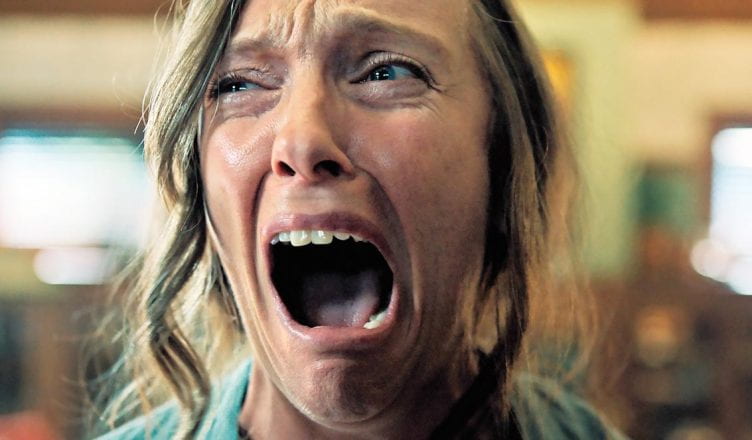Film Deets:
Director: Ari Aster
Screenplay: Ari Aster
Actresses: Toni Collette
Category: Maternal Grief
Themes: Grief, Family Trauma
Why do these screams matter?
Critically acclaimed, Hereditary is a powerful examination of maternal grief through the conventions of supernatural horror storytelling. Having just lost her mother, Annie (Toni Colelette) struggles to make sense of the difficult relationship they shared only to endure another unimaginable loss that further fractures the family.
In our first clip, Peter (Alex Wolff) has returned home from a party shell shocked that an accident has left the decapitated body of his younger sister in the backseat of the family car. As evening turns to morning, we hear Annie awake and begin her morning routine; a routine interrupted by a horrific discovery.
Annie’s screams in this scene slowly escalate into a crescendo of grief that contrasts with Peter’s shock-fueled emotionlessness. This hysterical versus stoic response dichotomy is a complicated one since the responses are both authentically organic while also being problematically gendered. Certainly, the loss of a child coupled with the grotesqueness of the state of Charlie’s (Milly Shapiro) body is enough to incite Annie’s hysterical response. But when compared against the restrained grief of her husband and the dispassionate reaction of her son, Annie becomes the overwrought woman who can’t control her emotions.
Because hysteria was the first mental illness to be associated with women exclusively, it is a label that carries with it a specific set of audience expectations. “Hysterical” becomes a type of cultural shorthand that positions women as unstable. This implied instability is then leveraged in the film to position Annie as a potentially unreliable narrator, which greatly colors her subsequent interactions with her son.
Our second scream takes place while Annie, Peter, and Steve (Gabriel Byrne) sit in relative silence at the family dining room table. The only sounds that are heard are from the cutlery as Peter and Steve eat and Annie plays with her food. But silence soon turns to rage as long-simmering tensions between Annie and Peter finally erupt.
The notion that a good mother would never scream at her child gets radically upended in this scene and demonstrates the profound impact a legacy of family trauma can have on interpersonal familial relationships. According to the Spring 2019 Stanford Medicine Bulletin, “Dr. Rachel Yehuda, a neuroscientist at the Mount Sinai School of Medicine, offered an intriguing new idea: that children of traumatized parents are at risk for similar problems because of epigenetic changes that occurred in the biology of their traumatized parents.” In other words, generational trauma may fundamentally change people at a cellular level such that the trauma can be passed down to future generations. For Annie, whose own fraught and difficult relationship with her mother expresses itself in behaviors consistent with post-traumatic stress disorder, her rage is both a by-product of her anger at Peter for his actions and at her mother for failing to provide the stable upbringing for which Annie yearned. Annie’s screams at Peter are an expression of the cyclical trauma that has followed her from childhood into adulthood and further positions her rage as hysterical, especially when contrasted against Peter’s caustic but controlled retorts.
That Annie is ultimately proven correct in her suspicions at the film’s conclusion are of little consequence because her family- and the audience by extension- have already dismissed her warnings as the rantings of an unstable woman consumed by grief. It is a profound indictment of the ease by which women can be marginalized for daring to be emotional.
Works Cited
“A Legacy of Trauma.” Stanford Medicine Bulletin, Spring 2019, stanmed.stanford.edu/2019spring/book-unspeakable-mind-ptsd-expert-shaili-jain-trauma-legacy.html.
Hereditary. Directed by Ari Aster, performances by Toni Collette, Milly Shapiro, and Ann Dowd, A24, 2018.
Tasca, Cecilia et al. “Women and Hysteria in the History of Mental Health.” Clinical Practice and Epidemiology in Mental Health, vol. 8, 2012, pp. 110-119.






